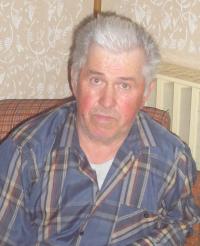"In 1945, when we finally arrived, we were going to Poznań but we stopped at Kobyle Pole and the shooting started all of a sudden. People thought that the Germans came back, that they repelled the Russki from the frontline. All sorts of weird and wonderful things happened, because we could be right under fire, because fire was coming from many sides. Nobody knew that it was already the end of the war, and that they had signed. That nice day befell us at Kobyle Pole near Poznań, at a dead track, where we were. Later on, after two days, the train started from Kobyle Pole. And the train arrived in Krzyż, and in Krzyż at the Wałcz track, also a dead track, and we were to detrain there. We unloaded with difficulty, because my father as a cripple could not do anything, and there were two wagons to unload. It was quite a job to unload two wagons full of everything. First we found ourselves in front of the school, where the secondary and grammar school is now, and the park, we stayed two days more at that park, we stayed two nights at that park. I grazed the cows in the railway park at Staszica Street. That job caught me when I was nine. Water was extremely dark but was flowing very rapidly in that canal which is no longer there. Thus, we went there to search around. At the time we arrived our train was the first train to Krzyż, the first transport of repatriates from behind the Bug River. Two days later people from Tarnopol arrived, just like we did. They were also all detrained to that park, and everybody who wanted … Houses were empty in Krzyż, all of them vacant. We as children, I was nine, were running from house to house, we were not interested in anything. We came to one of the houses; there was a decorated Christmas tree, by the school, that is inside. There was nobody inside, the doors were open, and there were pots and glasses, everything in sideboards. But since it was not ours, as the children were told then: “Do not touch if it is not yours.” So we ran around a bit looking for a ball, we wanted to find a ball, so to say. And later on, on 13 May we already started to change for Lubcz Wielki, because our father found a house. There was a vacant house there, not closed, open. There was nothing inside apart from straw. The Russki troops, when they were moving with the front, stayed at that house, on the straw on the floor. Because we are close to the border with Drawsko, the Noteć River, the Polish-German border, the houses in the nearest villages were already all looted. Not a single animal, not a dog, not a cat, nothing. Everything was empty. The Russki took the cows away. Only some agricultural machines were standing at the barns, because nobody needed them yet, it was still like that. And there was not even a single chair in the house, nothing, only, like the Russki could have behaved at home, the troops, can you imagine, there was one room where they relieved themselves, because no one would go out."

